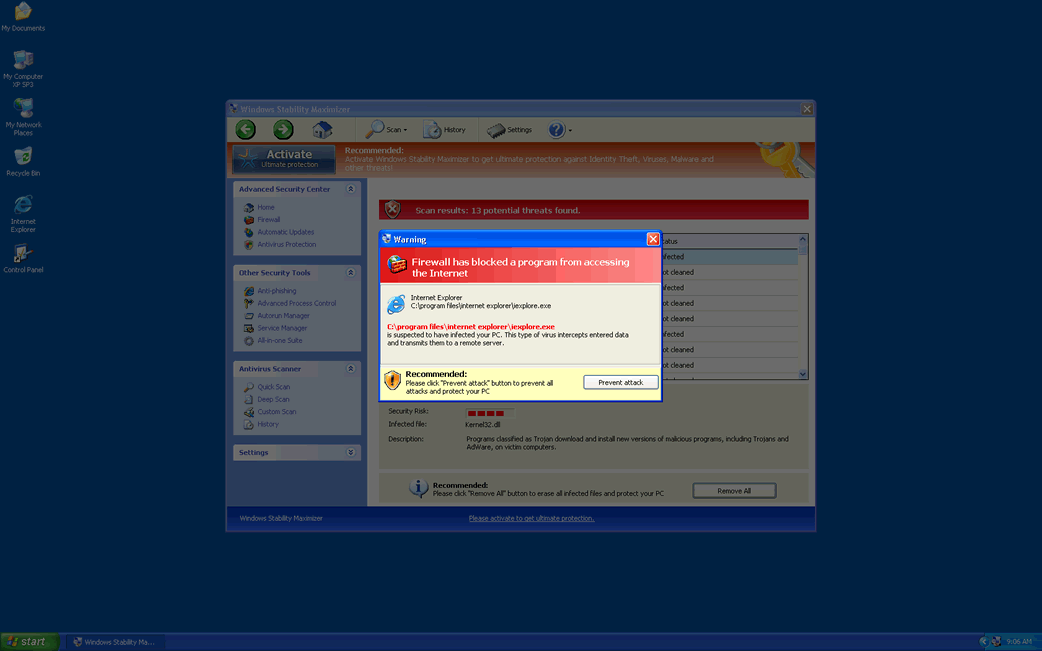Windows Stability Maximizer
Threat Scorecard
EnigmaSoft Threat Scorecard
EnigmaSoft Threat Scorecards are assessment reports for different malware threats which have been collected and analyzed by our research team. EnigmaSoft Threat Scorecards evaluate and rank threats using several metrics including real-world and potential risk factors, trends, frequency, prevalence, and persistence. EnigmaSoft Threat Scorecards are updated regularly based on our research data and metrics and are useful for a wide range of computer users, from end users seeking solutions to remove malware from their systems to security experts analyzing threats.
EnigmaSoft Threat Scorecards display a variety of useful information, including:
Ranking: The ranking of a particular threat in EnigmaSoft’s Threat Database.
Severity Level: The determined severity level of an object, represented numerically, based on our risk modeling process and research, as explained in our Threat Assessment Criteria.
Infected Computers: The number of confirmed and suspected cases of a particular threat detected on infected computers as reported by SpyHunter.
See also Threat Assessment Criteria.
| Ranking: | 6,112 |
| Threat Level: | 20 % (Normal) |
| Infected Computers: | 2,050 |
| First Seen: | April 9, 2012 |
| Last Seen: | August 31, 2023 |
| OS(es) Affected: | Windows |

Windows Stability Maximizer Image
It is easy to be fooled by Windows Stability Maximizer's interface and appearance. Criminals have designed Windows Stability Maximizer to mimic the Microsoft Security Center, a legitimate anti-malware tool. However, once you take a look under the hood it is obvious that Windows Stability Maximizer has no actual anti-malware capabilities. In fact, ESG malware analysts warn that Windows Stability Maximizer is designed to do nothing more than display numerous misleading security alerts, provide an interface that is nice to look at but ultimately useless and attempt to direct its victims to its website so that they will hand over their money. Windows Stability Maximizer's claims that Windows Stability Maximizer will protect you from malware are laughable considering that Windows Stability Maximizer is a malware infection itself.
According to ESG malware researchers, Windows Stability Maximizer is part of a very large family of rogue security software known as the FakeVimes family. This family of fake security programs has been around since 2009. Windows Stability Maximizer has many clones, and among the most recent of these are included fake security programs with names like Virus Melt, Presto TuneUp, Fast Antivirus 2009, Extra Antivirus, Windows Security Suite, Smart Virus Eliminator, Packed.Generic.245, Volcano Security Suite, Windows Enterprise Suite, Enterprise Suite, Additional Guard, PC Live Guard, Live PC Care, Live Enterprise Suite, Security Antivirus, My Security Wall, CleanUp Antivirus, Smart Security, Windows Protection Suite, Windows Work Catalyst. If you find that a suspicious security program has entered your computer system and that it is spamming you with security alerts, it is highly likely that your computer has become infected with malware, especially if the security program in question cannot be removed easily through normal means.
Table of Contents
Taking a Closer Look at the Windows Stability Maximizer Scam
The Windows Stability Maximizer scam has proven to be quite effective in fooling inexperienced computer users into giving up their money. It basically consists in making computer users believe that their computer is under a malware attack (that is, from malware apart from Windows Stability Maximizer itself). To do this, Windows Stability Maximizer is designed to display fake error messages and misleading system alerts. It can also affect an infected computer system's performance by making it slow, unstable or affecting its files and desktop.
The goal of this campaign of harassment is to convince the victim to buy a 'full version' of Windows Stability Maximizer in order to fix these supposed problems on the infected computer system. However, there is no difference between Windows Stability Maximizer's supposed full version and a normal Windows Stability Maximizer infection. Once the victim has paid for this useless program, the infected computer will likely remain the same until a real anti-malware program is used to remove Windows Stability Maximizer.
Windows Stability Maximizer Video
Tip: Turn your sound ON and watch the video in Full Screen mode.

File System Details
| # | File Name |
Detections
Detections: The number of confirmed and suspected cases of a particular threat detected on
infected computers as reported by SpyHunter.
|
|---|---|---|
| 1. | %AppData%\Protector-.exe | |
| 2. | %AppData%\NPSWF32.dll | |
| 3. | %Desktop%\Windows Stability Maximizer.lnk | |
| 4. | %CommonStartMenu%\Programs\Windows Stability Maximizer.lnk | |
| 5. | %AppData%\result.db |
Registry Details
URLs
Windows Stability Maximizer may call the following URLs:
| galaxyact.ru |

